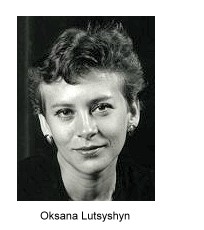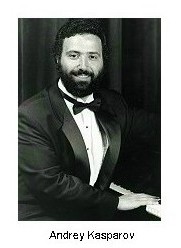Reviews
Lisa Coston, Oksana Lutsyshyn and Two
Composers
An art song recital and piano recital were
combined into one program at Prince of Peace Lutheran Church in Virginia
Beach, May 19, 2002. Two composers, Jeraldine Saunders Herbison and
Andrey Kasparov, were in attendance to hear their compositions played
by Oksana Lutsyshyn, a world-class performer, teacher and recording
artist. She currently teaches at the Governor's School for the Arts
and is music director and organist for this church. Her doctoral degree
is from Moscow State Conservatory. After moving to the U.S. she was
a Visiting Scholar at Indiana University in Bloomington.
The program opened with two piano pieces
by Herbison, who later commented that Lutsyshyn had found a way to shape
her music that she had not known was in her piece. Certainly there were
bell-like ringing tones in the piano that pleased this listener.
 Lisa Relaford Coston, mezzo-soprano, chose
three songs on texts by American women composers, and caressed the musical
lines with a warmth and energy rare on any stage. To a poem by Anne
Bradstreet To My Dear and Loving Husband (2000), composed by
Allan Blanc (b.1925). It is a bittersweet love song addressed "to the
beloved when I live no more." In The Crazy Woman, a poem by Gwendolyn
Brooks set by William Bolcom (b.1938) the protagonist will wait for
November to sing the song that people want her to sing in May. This
was dedicated to Ms.Coston's and Ms. Lutsyshyn's husbands! Frederica
von Stade wrote the poem The Route to the Sky set by her friend
Jake Heggie (b.1961). With a lovely deep tone and joy of expression,
this whimsical story of two sisters who climb out on a roof and have
to be rescued, sparkled.
A solo piano piece Toccata (1983)
by a sixteen-year-old Andrey Kasparov , ended the first half. This piece
required great technical skill and the music had an intense, even ferocious
quality. Occasionally there was a light-hearted phrase and then a return
to great speed and intensity. The pianist was up to the challenge and
the audience responded warmly to the performer and the composer.
After the intermission Ms. Coston sang How
Can I Keep From Singing, an Amercian folk hymn. Sung a capella in
a natural voice the song had a mournful quality with the gentleness
of a lullaby. Devotion by John Ness Beck is an arrangement of
the old hymn tune "I am thine O Lord, draw me nearer to thee." Come
Thou Fount of Every Blessing, wonderfully arranged by Richard Walters
gave full expression to the dynamics and range of our soloist's voice.
Arranged by T. Keesecker, Soul, Adorn
Yourself With Gladness was a piano solo performed by our dynamo
of a pianist, Ms. Lutsyshyn. Give Me Jesus arranged by Moses
Hogan and Scandalize My Name arranged by Hall Johnson followed.
Ms. Coston's diction was impeccable, making the song accessable to every
listener. She closed her recital with He's Got the Whole World in
His Hand arranged by Margaret Bonds. Once again this rich deep mezzo
voice caressed our hearts to send us out into the world rested and restored.
A Few Words About the Composers

Jeraldine Saunders Herbison (b.January 9,
1941) is a native of Richmond and has a degree from Virginia State College,
where she studied composition with Undine Smith Moore. An active teacher
for many years, Ms. Herbison has received awards for her compositions.
She has written fifteen or so art songs. A favorite of ours is In
Time of Silver Rain on a text by Langston Hughes.
Dr. Andrey Kasparov, born in 1966 in Azerbaijan
to a family of Armenian descent, began studying music at age six. At
15 he moved to Moscow and later graduated with honors from Moscow State
Conservatory in piano and composition. He earned his doctorate in composition
at Indiana University. Currently teaching at ODU, he directs the new
music ensemble Creo. His compositions have been performed in
many major cities around the world, and he has received several composition
awards.
Lisa Coston's
Recital, February 23, 2003
The sound of a deep rich mezzo-soprano voice sings:
"Give me Jesus, give me Jesus,
When I come to die, give me Jesus.
You can have all in the world.
Give me Jesus, nobody but Jesus."
It was a poignant moment as Lisa Relaford Coston
sang Give Me Jesus arranged by Moses Hogan, who died on February
11, 2003 of a brain tumor after a long illness.
The concert titled "American Delights," was part of the Great Bridge
Presbyterian Church's "Candlelight Concert Series." Oksana
Lutsyshyn accompanied the songs and played Sonata #1 in three movements by Andrey
Kasparov (b.1966). This virtuosic piece demands a ceaseless flow of brilliant keyboard work with many
sections with dense textures of great intensity. Two passages call for
the pianist to stand and dampen the strings with one hand while playing with the other.
Ms. Lutsyshyn played brilliantly.
The songs were a reprise of Ms. Coston's recital at Prince of Peace
Lutheran Church on May 19, 2002. I quote below from Issue #12.
Lisa Relaford Coston, mezzo-soprano, chose three songs on texts by American women composers,
and caressed the musical lines with a warmth and energy rare on any stage. To a poem by Anne Bradstreet To My Dear
and Loving Husband (2000), composed by Allan Blanc (b.1925). It is a bittersweet love song addressed "to the beloved
when I live no more." In The Crazy Woman, a poem by Gwendolyn Brooks set by William Bolcom (b.1938) the
protagonist will wait for November to sing the song that people want her to sing in May.
... Frederica von Stade wrote the poem The Route to the Sky set by her friend Jake
Heggie (b.1961). With a lovely deep tone and joy of expression, this whimsical story of two sisters who climb out on a roof and have to be rescued,
sparkled.
After the intermission Ms. Coston sang How Can I Keep From Singing, an Amercian
folk hymn. Sung a capella in a natural voice the song had a mournful quality with the gentleness of a lullaby. Devotion
by John Ness Beck is an arrangement of the old hymn tune "I am thine O Lord, draw me nearer to thee." Come Thou
Fount of Every Blessing, wonderfully arranged by Richard Walters gave full expression to the dynamics and range
of our soloist's voice.
Arranged by T. Keesecker, Soul, Adorn Yourself With Gladness was a piano solo
performed by our dynamo of a pianist, Ms. Lutsyshyn. Give Me Jesus arranged by Moses Hogan and Scandalize My Name
arranged by Hall Johnson followed. Ms. Coston's diction was impeccable, making the song accessable to every listener. She
closed her recital with He's Got the Whole World in His Hand arranged by Margaret Bonds. Once again this rich deep mezzo
voice caressed our hearts to send us out into the world rested and restored.
Lisa Relaford Coston and Pianist Allen Shaffer present
A Concert of Sacred Songs
March
9, 2008. Christ and St. Luke's Church, Norfolk, Virginia. In a program
on Sunday afternoon an audience of 100 gathered to hear music by
Stephen Adams, Bach, Beethoven, Bonds, Burleigh, Dvorák, Ives, and
Respighi. Three songs by Ludwig von Beethoven (1770-1827) came first.
The powerful piano chords begin and end the declamation in Die
Ehre Gottes aus der Natur (The Glory of God in Nature) while
Bitten (Prayer) has a soft, consoling vocal sound where Ms.
Coston's solidly grounded voice shines with joy. Bußlied
(Song of Repentance) has a sound that we associate with Schubert.
The pianoforte was new and Beethoven's creative experiments in musical
accompaniment would come to fruition in Schubert and Schumann. The
black cloud of sin in the first three verses of this strophic song
lifts when Ms. Coston sings "May you fill me early with Your grace."
The piano sound is more energetic and richer and the voice is joyous.
Continuing the Easter theme they gave us Erbarme dich (Have mercy) from Bach Saint Matthew Passion, BWV 244. Peter has just denied his Lord three times and now the alto pleads for mercy for him while Peter sheds bitter tears. The piano recreates the legato violin accompaniment as Allen Shaffer keeps the pulsing rhythm with the pedal. A subtle but effective technique in a very comfortably paced vocal display.
In a setting by Ottorino Respighi (1879-1936), the spare piano and plaintive vocal chant of Io sono la madre creates the pathos of the Mother who mourns her well-beloved son who has been crucified. The long pause after the piano was silent let the words enter our consciousness before applause began. The Holy City by Stephen Adams (1844-1913) has triumphal piano interludes between each verse celebrating the accomplished mission of salvation as the vocal line goes higher and higher in exaltation.
After intermission we heard three selections from Antonín Dvorák's (1841-1904) cycle of ten Biblical Songs, op. 99 (1894) on texts from Psalms. The best known of these, By the Waters of Babylon, is a song of exiles remembering their homeland with deep affection. It is interesting that Dvorák was in New York City, away from his homeland when he set these texts. Sing ye a joyful song is a hymn of praise as is Sing to the Lord a new song. Ms. Coston's diction is so clear and the passion and pathos in these songs is just right.
I really wanted to stand and clap and shout with joy when she finished singing Three Songs: At the river (1916), Serenity (1919) and In the mornin' (1929) set by Charles Ives (1874-1954). Ives, by stepping away from what he was taught of European music, became the first truly great creative American composer. Ives takes these familiar songs and makes them new. At every turn he gains our attention because he takes us out of our well-trodden groove of how we expect these songs to sound and challenges us to once again interact with the words we are hearing. In At the river he veers away from the usual tune, keeping us a bit on edge and leaves us hanging at the end: will we indeed gather at the river? In Serenity, the bell-like accompaniment and the quiet, gentle vocal create the sense of serenity that the words speak of. In the mornin' is a spiritual text set as an art song that captures the deep feeling of "twixt the cradle and the grave give me Jesus."
They followed Ives with spirituals set as art songs by Harry T. Burleigh (1866-1954). As you can see from the dates, Burleigh and Ives were contemporaries and both died the same year and yet their paths most likely never crossed. Burleigh, encouraged by Dvorák whom he met in New York City, set down the spirituals which are truly American indigenous music. Didn't my lord deliver Daniel (1916), a quick-step tune with lively piano has an operatic vocal ending. I want to be ready (1917) and Sometimes I feel like a motherless child (1917) a lament of being a long way from home, are songs of courage of how to get through this world.
Ms. Coston closed with a signature tune - He's got the whole world in his hands (c.1960) set for soprano Leontyne Price by Margaret Bonds (1913-1972). In a gutsy move she chose for her encore Burleigh's Deep River, written for baritone, which starts low and taps into an incredible richness of the lowest notes in her range.
I don't know what your definition of a world-class performance is but I have no doubt we heard one here. Allen Shaffer gave Lisa Coston the Ives songs and together they created a magical program within a church setting using sacred songs.
Printer Friendly Format
Back to Top
Back to Review Index
Home
Calendar
Announcements
Issues
Reviews
Articles
Contact
Us
|


